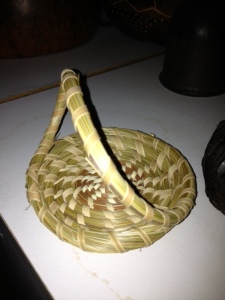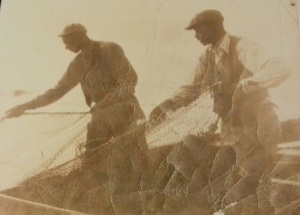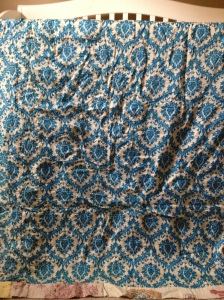De Nyew Testament Bible (The New Testament Bible) is written in Gullah, which is the language spoken in the coastal areas of South Carolina and Georgia. Because of it’s isolation, people who were brought to these islands from West Africa best maintained their customs, which is called Gullah. Gullah is a mixture of West African and English customs and language. De Jew Law an’de Promise wa God Gii (“The Covenant God made with the Children of Abraham”) talks about God’s promise to bless the descendants and make them His own special people. Abraham agreed to go to the land that God would show him.
A promise was made to the Gullah people as well. At the end of the Civil War, General William T. Sherman (no relation to the General Sherman who burned down Atlanta) issued Special Field Order #15 that Promised the Sea Islands from South Carolina to Florida that had been abandoned by the plantation owners to the former slaves. Now of course Andrew Johnson, who replaced President Abraham Lincoln after he was killed, recinded the order, enabling the plantation owners to return. However, most of them had financial hardship and couldn’t afford the taxes on their property, so they left it behind. The land now belonging to the Black people were sectioned off into their family communities, where they maintained their Gullah lifestyle and that land was passed down from generation to generation.
If you have been following my blogs, you know that I was born in New Jersey and my dad is from Hilton Head. Our family has owned property on Hilton Head since the Civil War. I can’t remember a time when my father did not tell me about farming, fishing, and setting the cattle off to graze in the now famous Sea Pines (where Tiger Woods plays golf). Of course, they got back more cattle than they sent out because they had given birth to calves. Dad told me about the Christmases on the island where it was the custom to go from house to house and partake of the food each host had cooked. To refuse to eat would be an insult. As much as my son loves to eat, I think he would have very much enjoyed that custom.
With my visits to Hilton Head, I had my own memories of taking that 16-hour car trip. That last hour was always the longest because the journey from the highway to the coast was under a leafy canopy, which consisted of oaks and palmettos so dense that it kept out much of the sunlight (or moonlight depending on the travel time). I remember jumping the waves at the beach and playing in the yard while minding that we stay out of the way of Granddaddy’s horse. One of my favorite memories is shelling beans with my grandmother in her fruit and vegetable stand. She always gave me a peach and liked to send me home to New Jersey with some as well.
By the time I moved to Hilton Head in the 80’s, people were making the island their home, which I talk about in depth here. That meant saying goodbye to the trees. Places where we would go freely were being gated off, and our neighbors were selling their land.
When I was in high school, I did a report about my grandmother and how Hilton Head used to be. My classmates, who were from other places didn’t know and were very interested. Since that time, I have been interested in learning and teaching the traditions of the Sea Islands, particularly from the point of view of my family. My great aunt wove the sweet grass baskets people pay a fortune for at the Charleston Market. Unfortunately, that skill died from my family when she did.
The Sea islands are a fishing community and wove their own casting nets. My dad still has one my granddaddy made hanging in the garage.
My grandmother sewed quilts. Until she died, every great grandchild was gifted with a quilt from her. It’s one of the covers my son kicks off of him every night.
These customs are dying because we aren’t learning them from our parents and grandparents. When we young people don’t learn the traditions of our forefathers, we don’t see the value in them and as a result, we are selling off the land for less than what it’s worth, and for less than what the developers are getting. Now young people have no where on these islands to return and no legacy to leave to their children. I believe that our Gullah traditions are tied to the land that had been promised to us.
When I wrote The Promise of Palmettos, this is the story that I wanted to tell except using a fictional place and characters. It is about a strong family who is trying to hold onto their land in spite of the odds. The islanders are starting to see the consequences of not valuing their heritage.
Admittedly, I cannot weave a basket, although I’m going to ask Mom, who has taken a couple of lessons to teach me. I can sew a button or maybe a rip but even that may result in my needing band aids. I buy my casting net at Dick’s Sporting Goods.
The places that my dad and grandmother told me about are gone, as well as the places where I grew up knowing. As a result, I have to recall family memories, do research, and then put everything into a story so that my children can read about it. Most importantly, they need to hold on to the land. To that, they need to understand where they come from. Once they understand that, they will understand that everything that they have needs to be preserved.



I’m ashamed to admit that I never heard of the Gullah Islands until I met you. So much of our collective history is either ignored, surpressed or forgotten through the generations. I applaud you for doing what you can to preserve these memories for your sons.
LikeLike
Don’t be ashamed. The point is that you know now. There are still some people who don’t know at all. Until I met you, I have never heard of the Mardi Gras Indians. You have the best grasp of New Orleans history of anyone I have ever known and I am always excited to learn new things from you about that. We come into each lives for a reason. For us it’s to learn from each other, share our experiences, and to have fun 🙂
LikeLike
Pingback: The Promise of Palmettos | Palmetto Author
Reblogged this on Palmetto Author and commented:
Reminding myself what it is all for.
LikeLike
I was thinking that this post sounded familiar, then I saw my comment. Thanks for reposting.
LikeLike
Thanks for your comments. I needed some motivation to get me ready to return to school tomorrow.
LikeLike